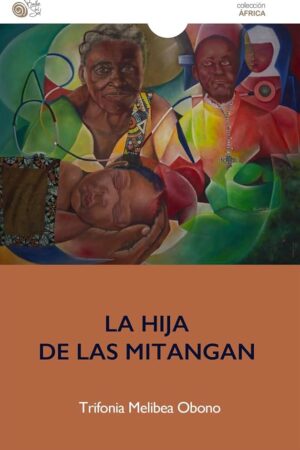The Mitangan's Daughter
A powerful novel that sheds light on the lives of Fang women in Equatorial Guinea, exploring identity, tradition, and colonial legacy.
Lucía, an eight-year-old girl, is admitted to the Mikomiseng Home, in a city in what was then Spanish Guinea, by order of the doctor and colonist Víctor Martínez. The order for the child’s admission to the institution, run by the nuns of the Immaculate Conception, is issued during the height of Spanish colonialism in the land of the Fang ethnic group. Thanks to the home, she is educated in various subjects, including reading, writing, and the strict imitation of the Virgin Mary.
However, the sudden arrival of the autonomous regime and Equatorial Guinea's subsequent independence in 1968 dramatically changes the course of Lucía's life. With the closure of the home, she is forced to return to her family and reintegrate into Fang society. This transition is not easy, and Lucía, having been raised and educated under colonial influence, struggles to adapt to a community that values traditional customs and practices over the Western ideals she has been taught. She finds herself caught between two worlds: on one hand, the colonial legacy that shapes her understanding of identity, religion, and femininity, and on the other hand, the deeply patriarchal Fang society, which expects women to conform to rigid gender roles and cultural expectations. Lucía’s education, particularly her literacy, becomes a double-edged sword, giving her an awareness of possibilities outside her village but also isolating her from her people, who view her as an outsider. In this new, independent Guinea, the ruling elite, like much of society, seeks to erase colonial influence and return to an idealized vision of a pre-colonial African past, further complicating Lucía’s attempts to forge an identity in a rapidly changing world.
Request more informationOriginal Language
SPANISH | Baile del Sol
Prizes
Winner of the 2023 Periplo Prize
Reviews
"The brave and raw account of an endless succession of violence; the harrowing struggle of one woman, of all women." José Naranjo, El País
"Through its vibrant blend of testimony, poetry, dialogue, essay, and narrative, La hija de las mitangan is Trifonia Melibea Obono’s greatest literary achievement to date—a fearless writer who is set to place Equatorial Guinea on the literary map of the world." Alfonso Armada, journalist and writer
"La hija de las mitangan thus becomes another essential, and hopefully foundational, reference book for Guinean literature in general, and especially for that which is being created—and will be created—by the new generations who are opening up to the world." Xavier Montanyà, Vilaweb
"A constant theme in Obono’s works is the prominence of female voices and the transgression of the conventions, rituals, and taboos of Fang culture regarding gender determinism. The home, family, motherhood, the body, work, domestic space, the village, and the community become highly politicized." Benita Sampedro Vizcaya, Hofstra University (NY)
"Obono’s work, beyond its literary aspect, is part of the new African tamtam that the new generations are currently formulating as they present topics and paradigms in postcolonial societies to address the current mental stagnation characterizing Black Africa in the dawn of the 21st century." Joaquín Mbomío, Guinean writer exiled in France
"In the emerging literary scene of Equatorial Guinea, the Fang writer leads readers through the political and social upheavals that shape Lucía’s life." Laura Degrado, EFE
